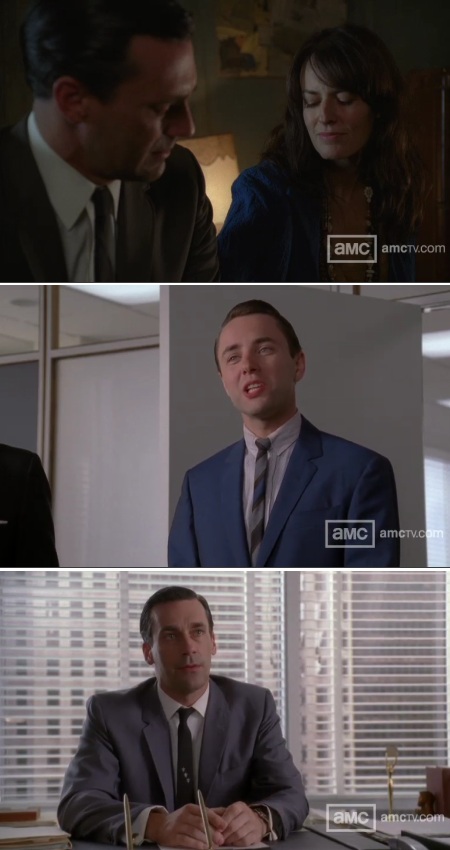This! Is! Mad Men! – Blowing Smoke

[This! Is! Mad Men! is a recap of the newest developments of Don Draper and his lovable gang of capitalist sleazeballs. Sometimes it’s liveblogged, sometimes not. In the spirit of the show, the post itself will often be sexist and drunk. Apologies ahead of time.]
It’s no secret that Mad Men is filled with flawed characters. From the very first episode, this show has taken the viewers through the ups and downs of some of Madison Avenue’s most promising advertisers. While these trials and tribulations are entertaining in and of themselves, it is more interesting to search for the motivations. What is the impetus that makes [name a character] behave this way? Why are these individuals so incapable of veering away from self destruction?
Tonight, I think Blowing Smoke might have delivered an answer: addiction.
I’m not referring to the rampant alcoholism; that’s been covered so many times at this point that it’s hardly worth mentioning. Yes, all the characters drink. Let’s move on. What I’m actually referring to are addictive personalities and the ways in which they manifest. Sure, some of the characters are physiologically dependent on substances, but others are bound to ideas and ideals.
Yes, this shit is layered.
And that’s why Mad Men is so fuggin’ good.
Okay, so Blowing Smoke brings Don’s original Beatnik lover Midge back into the fold. But instead of being a fun-loving pot-smoker who enjoyed Draper’s touch, she’s now a junkie. Yup, Midge is chasing the dragon and has sought out Don as a means to getting some cash. Her husband-by-default even leaves the two of them alone in the apartment, presumably so that Midge can use her sex skills to secure the money.
Don gives Midge all the cash he has, taking a painting of hers so that she doesn’t feel like a total mooch. But he’s not offering her a new life. He’s not putting her in a cab towards a rehab or trying to get her a job somewhere. He’s just enabling her.
Don Draper is an enabler.
The second addiction highlighted in Blowing Smoke belongs to Pete Campbell. I guess it’s been showcased from the very first season, when Pete was vying for Don’s position back at Sterling Cooper, but only became conscious of it tonight. After seeing Campbell worrying about putting up money to keep SCDP afloat, watching him argue with his wife about the necessity of paying his share, and grimacing as he made a last-ditch effort to get a bank loan, it became so damn apparent.
Pete Campbell is addicted to the pursuit of success.
Campbell is the scrappy guy in the playground fight, the runt of the litter, the dude that was always told he wouldn’t amount to anything. In seasons past, we saw Pete struggle to gain the favor of his father, the same man that disapproved of his job and career goals. But he persisted, because he has an innate desire to succeed. He doesn’t want the sum total of his life to be a byproduct of his family name.
As such, Pete Campbell cares about Sterling Cooper Draper Pryce with a fervor the other partners don’t know. He is addicted to the process of pushing himself as hard as he can, hoping to gain not just money but prestige and a sense of genuine accomplishment. So when he doesn’t think he’ll be able to pay in (thereby forfeiting his status as partner), he starts to go through withdrawal. So when Draper fronts his share of the cash, Pete is beyond grateful. But what if SCDP is going under anyways? What if all Don has done is delayed Pete’s journey towards success by giving him the false hope that the agency can be turned around.
Again, Don Draper is an enabler.
Now, of course I have to touch upon Don’s addiction. I’m not going to say that he’s addicted to booze or women (although he is). What Donnie Draper uncontrollably pines for is power. Control. Being in charge of every aspect of his life at any given time. And this season, Draper hasn’t always had this upper hand.
In this episode, Don foresees the dismantling of his agency, a result of losing the American Tobacco account. So what does he do? He takes it upon himself to buy a one-page ad in the New York Times which he uses to publically announce that SCDP will no longer work with tobacco companies. It’s a bold move, essentially declaring that the agency does not want to help peddle a product that is so insalubrious. With the agency in such a tough spot, there’s something to be said for taking decisive action.
However, there’s also something to be said for conferring with partners. Draper, in a near-panic over the thought that he’s losing control, wrote this proverbial manifesto without any outside input. Then, he purchased an ad in the New York Times without even mentioning it to Roger, Bert, Lane, or Pete. They’re all quite miffed at Draper, and Bert Cooper has vowed to step out of the agency. And as he’s parting, he looks at Don and exclaims, “We’ve created a monster!”
He could’ve held off on the action, going to the office and actually running it by someone else. But doing so would’ve have been an admission of needing others, requiring help from an outside source. And this is counterintuitive to Don’s addiction to self-preservation. This addiction to empowerment is driving a wedge further into the already fragile solidarity of the partners. Things aren’t looking too hot, and there’s a couple of reasons why.
Don Draper is an enabler. And he’s also an addict.



